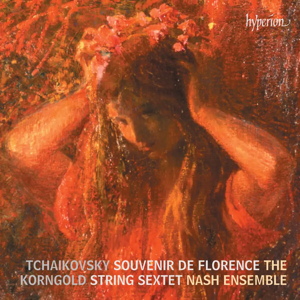
Pyotr Tchaikovsky (1840-1893)
String Sextet in D minor Souvenir de Florence Op. 70 (1892)
Erich Wolfgang Korngold (1897-1957)
String Sextet in D major Op. 10 (1917)
The Nash Ensemble
rec. 2023, St. Silas the Martyr, Kentish Town, London, UK
Hyperion CDA68406 [70]
I am not sure whether Brahms was the first composer of note to write string sextets, but he certainly set a good example. He left us two, and there is a handful by other composers. As well as the two we have here, I am aware of examples by Schoenberg (Verklärte Nacht in its original version), Schulhoff, Richard Strauss (the Prelude to Capriccio), Dvořák and Martinů. All are excellent works. We hear them too rarely in the concert hall, because they require either that an established string quartet should bring in two outsiders or, as here, that a flexible ensemble should assemble the necessary players.
Tchaikovsky’s Souvenir de Florence was his last chamber work and one of his last works altogether. There is a slight mystery about the title, since the work was not actually composed in Florence but in the Moscow area. However, Tchaikovsky’s brother Modest said that the theme in the second movement played over a pizzicato accompaniment was sketched by the composer in January 1890, when he was in Florence, working on his opera The Queen of Spades. Be that as it may, it is a charming and attractive work in four movements, full of good tunes and offering numerous opportunities for the different players to shine. There is none of the portentous writing you find in the symphonies; this is a light-hearted work. Perhaps some of the writing is rather orchestral, with, for example, tremolo figures and passages with the two cellos in unison, and indeed, the work is sometimes played in a version for string orchestra. However, as with Schoenberg’s Verklärte Nacht, also often played in a version for string orchestra, the original sextet version has its own integrity and character, and the quasi-orchestral passages are not disconcerting.
Korngold’s sextet, in contrast, was one of his earliest works, first performed in 1917 in the composer’s twentieth year. However, Korngold was a child prodigy and by then had already had two operas and a ballet performed publicly, as well as other works. This was his largest chamber work. Like Tchaikovsky, he started writing it while working on an opera, in his case Violanta. It is written in that lush, late romantic idiom which came naturally to him and which he continued to use throughout his life and made a staple of Hollywood film scores for a long time. He had clearly listened to the Brahms sextets, no doubt with the approval of his father, the critic Julius Korngold, who had a great influence over him. But I fancy he had also heard Schoenberg’s Verklärte Nacht, whom his father comprehensively disapproved of. I say this because there are occasional moments of more adventurous harmony, though Korngold nowhere approaches the expressionism which Schoenberg later embraced. Although less light-hearted than Souvenir de Florence it is also an attractive work, well worth getting to know, as indeed is all Korngold’s chamber music.
The Nash Ensemble is a group of musicians who assemble in various combinations to play chamber works. They are the leading such ensemble in Britain today and a worthy successor to the Melos Ensemble of the last century. The six players here play with such a shared vision and feeling for these works that you would think they had been playing sextets together all their career. When I first heard the opening of Souvenir de Florence, I found it a bit fiercer and more strongly accented than my reference version, which is the 1993 one by the augmented Borodin Quartet on Teldec. However, it is simply a slightly different view of the piece, and by the second hearing I had adjusted to it. The recording is up to Hyperion’s usual high standards.
There are many other recordings of both works, though in the case of the Tchaikovsky you need to distinguish between sextet versions and those for string orchestra. Indeed, Hyperion has previous recordings of both, from the estimable Raphael Ensemble. However, I realise with a start that they are both over thirty years old and, moreover, not coupled with each other. If this coupling suits, do not hesitate.
Stephen Barber
Previous review by Nick Barnard (March 19, 2024)
Buying this recording via a link below generates revenue for MWI, which helps the site remain free.



















